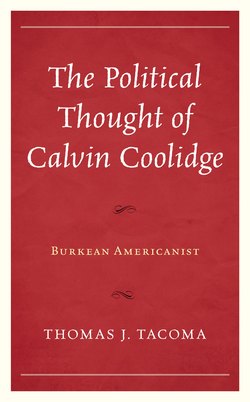Читать книгу The Political Thought of Calvin Coolidge - Thomas J. Tacoma - Страница 6
На сайте Литреса книга снята с продажи.
The State of Coolidge Scholarship
ОглавлениеMost Coolidge scholars have been biographers. The occasional intellectual historian has taken up his ideas and traced them to major sources of origin, but most studies of Coolidge have been biographical. Other works that touch on Coolidge have generally been historically oriented, for Coolidge features little in presidential studies and less in American political thought.[10] This should be at least somewhat surprising—Herbert Hoover is the subject of a large number of scholarly books on political thought in the 1920s, and even Warren G. Harding has his defenders and interpreters.[11] There is a definite gap here.
Historical studies of Coolidge largely fall into one of two camps. On one side stand those general histories of the era and its social thought, such as Paul Murphy’s The New Era: American Thought and Culture in the 1920s or Niall Palmer’s The Twenties in America: Politics and History, which mention Coolidge but usually without significant reference to his relation to America’s constitutional order.[12] On the other side, there are the Coolidge biographies, such as Amity Shlaes’s Coolidge or Robert Sobel’s Coolidge: An American Enigma, which focus on his life and thought but almost always much more on his presidency. In between there are specific studies of Coolidge-era policies or occasionally of his specific actions (for example, handling the Boston police strike, his childhood years, or his administration’s handling of European debt crises).[13] One exception to this pattern is Robert Ferrell’s outstanding study of Coolidge’s presidency, The Presidency of Calvin Coolidge, which begins to bridge the divide between biography and thought.
Coolidge biographies themselves have a history. The earliest biographers wrote during Coolidge’s lifetime and often with some political goal in mind—helping to elect him, or the converse.[14] Most of the work on Coolidge done between his death in 1933 and the 1980s was written by Progressive historians or their students, and they consequently maintained some bias against Coolidge, his policies, and his ideas. These include biographies such as William Allen White’s A Puritan in Babylon and Donald McCoy’s Calvin Coolidge: The Quiet President, as well as general historical works, such as Arthur Schlesinger’s Crisis of the Old Order.[15] These writers shaped the image of Coolidge for later generations of historians, including the textbook portrayal of Cal as a silent, stand-pat reactionary who sought to promote big businesses at the expense of everyone else (an image unfortunately repeated in David Kennedy’s magisterial Freedom from Fear: The American People in Depression and War and later in David Greenberg’s Calvin Coolidge).[16] However, beginning in the early 1980s, an effort to recover Coolidge and to vindicate his policies began. Thomas Silver’s Coolidge and the Historians marked the beginning of a changing tide when he took Schlesinger and other historians to task for their errors, distortions, and misrepresentations of Coolidge. Historian Paul Johnson likewise had high praise for Coolidge.[17] Some years later, Robert Sobel took up the task of writing a new and sympathetic biography of Coolidge—which biography stands out as the finest study of his political thought to date. Then, in 2013, Charles Johnson, Niall Palmer, and Amity Shlaes published independent biographical or political studies of Coolidge.[18] Their work has sought to remove the prejudices of earlier generations of biographers, to write sympathetically yet not uncritically of Coolidge.
In the much smaller field of studies that touch specifically on Coolidge’s ideas, several useful works have recently come to print. John Almon Waterhouse claims chronological precedence for his study of the connection between Charles Garman’s teaching and Coolidge’s political ideas in Calvin Coolidge Meets Charles Edward Garman, though L. John Van Til claims pride of place as better interpreter of the intellectual connections between them for Thinking Cal Coolidge: An Inquiry into the Roots of His Intellectual Life.[19] Arthur Fleser wrote a brief but illuminating volume on Coolidge’s rhetoric, which provided much-needed light on Coolidge’s writing style and speeches.[20] Most recently, Joseph Postell in 2013 and Gordon Arnold in 2019 have made a great effort to begin recovering Coolidge as a serious political thinker. In “‘Roaring’ against Progressivism: Calvin Coolidge’s Principled Conservativism,” Postell interprets Coolidge in the light of the American founding, and Arnold suggests in “Calvin Coolidge: Classical Statesman,” that Coolidge is best understood through the teachings of the great classical political philosophers.[21]
